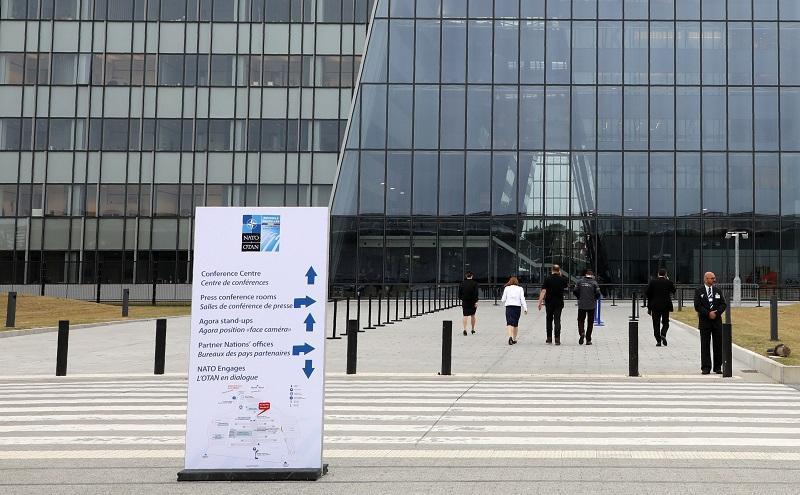
Pedestrians walk in front of North Atlantic Treaty Organization (NATO) headquarters in Brussels on July 10, 2018, ahead of NATO meetings. AFP PHOTO / ludovic MARIN
As Turkey is getting ready to take further role in NATO for upcoming missions, topics like stability in Syria and Iraq, cooperation in the fight against terrorism and Turkey’s procurement of Russian S-400 anti-missile defense systems are expected to be on the agenda of the Turkish delegation when the alliance’s summit starts in Brussels on July 11.
The delegation will be headed by President Recep Tayyip Erdoğan, who will attend the leaders’ summit in his first international gathering after being sworn in on July 9 for a new five-year term.
On the sidelines of the summit, Erdoğan will meet and hold bilateral meetings with a number of world leaders, including United States President Donald Trump, French President Emmanuel Macron, and British Prime Minister Theresa May.
Erdoğan is also expected to meet European Council head Donald Tusk, European Commission President Jean-Claude Juncker, and European Parliament President Antonio Tajani.
The NATO meeting will take place for the first time at the alliance’s new headquarters.
Turkey offers assigning Turkish deputy commander for NATO mission in Iraq
Amid concerns among NATO allies, primarily for the U.S., regarding Ankara’s decision to buy Russian S-400 surface-to-air missile batteries, which are not compatible with NATO’s defenses, Ankara has stepped up taking further role in missions of NATO, in an apparent sign of anchoring to the alliance.
One of them is assuming the command of NATO’s Very High Readiness Joint Task Force (VJTF) in 2021. The formation of such a force was decided at the NATO Wales Summit 2014 as a “Spearhead Force” to the NATO Response Force (NRF) for the intervention of a possible crisis within a week. Then-Prime Minister Ahmet Davutoğlu announced on May 2015 that Ankara had offered to assume the responsibility as a framework nation in the Very High Readiness Joint Task Force for 2021. The official decision among allies is expected to be taken at a ministerial level meeting in December 2018.
Seven NATO members contribute to the mission in six groups: The German-Dutch forces, the United Kingdom, France, Italy, Spain, Poland, and Turkey. It is a force of around 5,000 formed in five battalions supported by air forces, navies, and special forces of member countries.
On the other hand, Turkey will also contribute to a new training mission of NATO in Iraq which aims to increase efficiency and capacity of Iraqi security officials against terrorism. Turkey offered a Turkish deputy commander for the training mission.
Burden-sharing to dominate NATO Summit
The NATO summit will be a place for confrontation between U.S. President Donald Trump and member states over burden-sharing problems.
Trump has kicked off a weeklong Europe trip on July 10 with harsh criticism for NATO allies and predicted the “easiest” leg of his journey would be his scheduled sit-down with Russian President Vladimir Putin.
Trump said he “can’t say right now” if Putin is a friend or foe, but called him a “competitor.”
Speaking to reporters before leaving Washington for Brussels, where he is to attend the NATO summit, Trump criticized the pact, saying, “Frankly it helps them a lot more than it helps us.”
On July 9, he tweeted the situation was “not fair, nor is it acceptable” and insisted that NATO benefits Europe “far more than it does the U.S.”
Trump has been pressing NATO countries to fulfill their goal of spending 2 percent of their gross domestic products on defense by 2024. During his presidential campaign, he suggested he might only come to the defense of NATO nations that fulfilled their obligation. He continues to criticize NATO countries for not paying their fair share. NATO estimates that 15 members, or just over half, will meet the benchmark by 2024 based on current trends.
Tusk said on July 10 to Trump that “it is always worth knowing who is your strategic friend and who is your strategic problem.” Tusk recalled that the Europeans are spending more than Russia and as much as China on defense.
Seven out of 27 European members were on course to spend two percent of GDP on defense in 2018: Britain, Greece, Latvia, Estonia, Poland, Lithuania and Romania, NATO chief Jens Stoltenberg said on July 10.